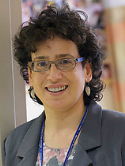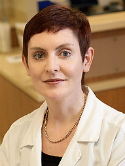An optimized search prognosis tool to predict 8/8 HLA allele-matched unrelated donor procurement Journal Article
| Authors: | Davis, E.; Archer, A.; Flynn, J.; Nhaissi, M.; Rapoport, C.; Suri, B.; Wells, D.; Papadopoulos, E.; Politikos, I.; Fingrut, W. B.; Scaradavou, A.; Barker, J. N. |
| Article Title: | An optimized search prognosis tool to predict 8/8 HLA allele-matched unrelated donor procurement |
| Abstract: | For patients in need of allogeneic transplantation who lack an HLA-identical sibling, an 8/8 HLA allele-matched unrelated donor (URD) is a standard alternative. However, delays in URD procurement can adversely impact patient care. Recipient genotype and search assessment (MSKv1.0)-based tools can predict search prognosis for many, but both tools have lower performance in non-European ancestry patients. Using the MSKv1.0 tool, we analyzed searches from 1530 potential allograft recipients (including 863 who underwent transplantation) with the aim of creating an optimized MSKv2.0 search prognosis tool that can classify a URD search as either Good or Poor with a high level of accuracy while also limiting an ambiguous Fair search prognosis regardless of patient ancestry. By MSKv2.0, the 8/8 URD search prognosis distribution was 57% Good, 21% Fair, and 22% Poor in Europeans and 15% Good, 21% Fair, and 63% Poor in non-Europeans. Importantly, compared to MSKv1.0, the likelihood of Fair categorization was reduced to <25% with comparable Fair rates (P = .847) in both European and non-European groups. Moreover, all patients with an MSKv2.0 Good prognosis had an 8/8 URD identified, and almost all of those who underwent transplantation had an 8/8 URD (Europeans, 99%; non-Europeans, 98%; P = .504). The MSKv2.0 tool also was highly accurate at classifying Poor searches, with <10% identifying an 8/8 URD, and almost all patients who underwent transplantation (Europeans, 95%; non-Europeans, 96%) receiving an alternative donor. Using preliminary search results, MSKv2.0 accurately classifies patients by likelihood of 8/8 URD procurement, greatly facilitating triage to 8/8 URD (Good prognosis) or alternative donor (Poor prognosis) transplantations. © 2023 The American Society for Transplantation and Cellular Therapy |
| Keywords: | adult; controlled study; human tissue; transplantation, homologous; major clinical study; allele; alleles; hematopoietic stem cell transplantation; allotransplantation; allogeneic transplantation; unrelated donor; unrelated donors; procedures; european; humans; prognosis; human; male; female; article; alternative donor; matched unrelated donor; patient triage; donor procurement; search prognosis |
| Journal Title: | Transplantation and Cellular Therapy |
| Volume: | 29 |
| Issue: | 5 |
| ISSN: | 2666-6375 |
| Publisher: | Elsevier Inc. |
| Date Published: | 2023-05-01 |
| Start Page: | 312.e1 |
| End Page: | 312.e5 |
| Language: | English |
| DOI: | 10.1016/j.jtct.2023.02.016 |
| PUBMED: | 36822475 |
| PROVIDER: | scopus |
| PMCID: | PMC10149615 |
| DOI/URL: | |
| Notes: | The MSK Cancer Center Support Grant (P30 CA008748) is acknowledged in the PubMed record and PDF. Corresponding author is MSK author Juliet N. Barker -- Source: Scopus |
Altmetric
Citation Impact
BMJ Impact Analytics
MSK Authors
Related MSK Work










